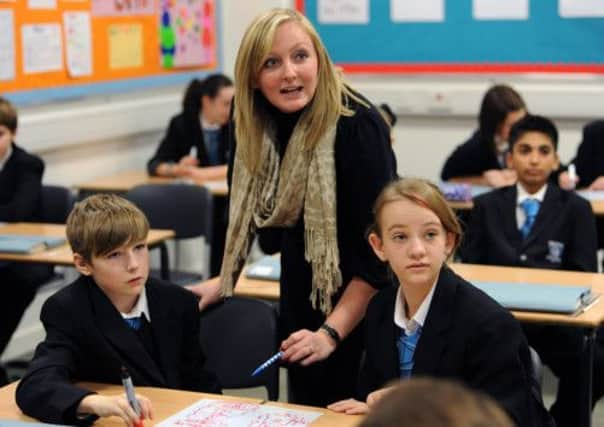Teachers to be given tests in standards drive


The questions on grammar and basic arithmetic are available online for anyone considering a career in teaching.
Devised by Education Scotland in partnership with universities, the tests are a direct response to a report published in 2011 by the former Chief Inspector of Education which called for an improvement in teacher training. Graham Donaldson’s report, “Teaching Scotland’s Future”, recommended formal assessments for those entering university courses.
Advertisement
Hide AdAdvertisement
Hide AdEducation Scotland said the new online tests had been developed in response to the recommendation, and would be complemented by assessments carried out by universities.
The tests have been published alongside a separate grammar guide for serving teachers who are not “fully confident” of how language works.
While the questions are not mandatory, they are designed to test those unsure about whether they have the adequate level of basic skills needed to go into the classroom. Lindsay Paterson, a professor of education policy at Edinburgh University, said evidence continued to show that many trainee teachers had “extremely poor” literacy and numeracy skills.
“The key thing is that people are coming into teacher training who haven’t picked up these skills anywhere else,” he said. “If people with better basic skills were coming into the profession, that would solve the problem.”
In February 2010, the Scottish Government asked Mr Donaldson to undertake a review of teacher education in Scotland. His report, published the following year, recommended wide-reaching changes in the entry route to teaching, qualifications and continued teacher education. Its 50 recommendations included one calling for “diagnostic assessments” in literacy and numeracy for all candidates attempting to win a place in teacher training.
The recommendation said the threshold for entry should allow for weaknesses to be addressed by the student during their course, but said a “demanding level” was necessary as a “prerequisite for competence to teach”.
Commenting on the new online tests, Bill Maxwell, chief executive of government body Education Scotland, said: “This new website is one part of our response to the report Teaching Scotland’s Future. It was developed in collaboration with Scottish universities and other national partners. The website will help to give aspiring teachers an understanding of what is involved in the role and the skills and experience required. This includes high standards of literacy and numeracy.”
However, Larry Flanagan, general-secretary of the Educational Institute of Scotland (EIS), the country’s largest teaching union, said there was no need for further testing of would-be teachers. “Our view is that the entry requirements for teacher training are, in themselves, sufficiently rigorous,” he said.
Advertisement
Hide AdAdvertisement
Hide Ad“Highers are the appropriate benchmark. In practice, very few students will get into teacher training courses without a strong suite of Highers across the board. If we are saying that having Higher English doesn’t mean you have basic literacy skills, then we are in serious trouble.”
The new website is due to be discussed at the annual Scottish Learning Festival, which takes place in Glasgow later this month. Leading figures from the world of Scottish education will also discuss a range of other measures being carried out in response to the Donaldson report.
Analysis: Numeracy fine, but spelling? Could do better
When I was asked to sit the numeracy and literacy tests, I took the precaution of taking the exam alone in a quiet room; the memory of scoring significantly less than my son in a MENSA exam (and his mocking laugh) still lingers to this day.
I got off to a flying false start when a rather oversized X signified that I had miscalculated a duathlon athlete’s cycling and running prowess. To be fair, I’d tackled the question as a mental arithmetic task.
Now, armed with paper and pen, I tried the section on rounding up. I breezed through it, slamdunking every challenge. Years of being belted by my
sadistic and misunderstood
primary teacher, Mrs McManus, had finally paid off.
I’m certain that, up in Heaven, she was smiling down while thrashing a tear-filled cherub. Some questions were a little tricky, but overall I think the numeracy exam is a good test of a prospective teacher’s ability with numbers.
In my view, the literacy section was a tad weak. For example, there wasn’t a section on spelling. It’s a teacher’s nightmare for a pupil to point out a misspelt word on the blackboard and I think that anyone considering entering the profession should be very competent in arranging letters in the correct order.
I think the website’s literacy and numeracy tests give an
aspiring teacher a fairly basic idea of what is required. And I’m fairly certain that anyone who really struggles with the tests will seek alternative employment.
How did I score? I’m too modest (embarrassed?) to say.
HUGH REILLY